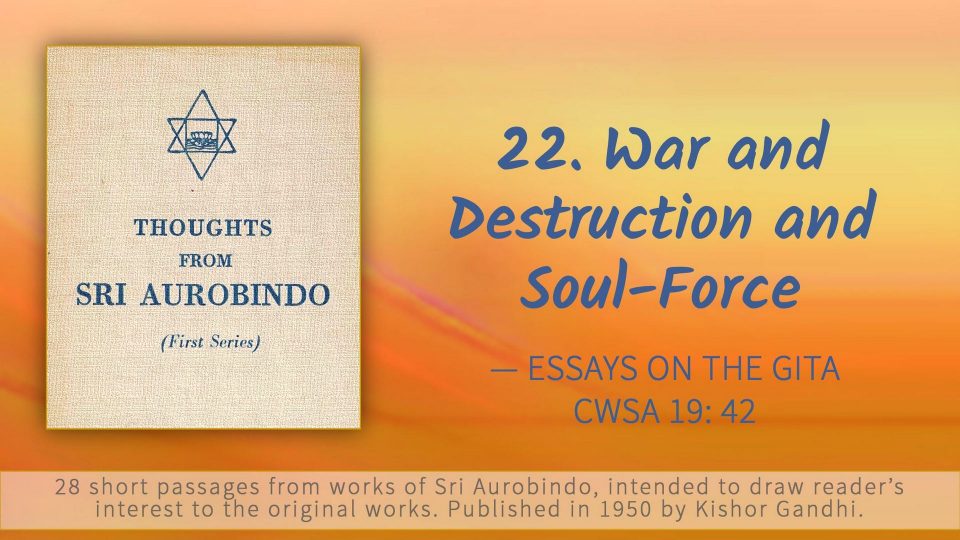
War and destruction are not only a universal principle of our life here in its purely material aspects, but also of our mental and moral existence. It is self-evident that in the actual life of man intellectual, social, political, moral, we can make no real step forward without a struggle, a battle between what exists and lives and what seeks to exist and live and between all that stands behind either. It is impossible, at least as men and things are, to advance, to grow, to fulfil and still to observe really and utterly that principle of harmlessness which is yet placed before us as the highest and best law of conduct. We will use only soul-force and never destroy by war or any even defensive employment of physical violence? Good, though until soul-force is effective, the Asuric force in men and nations tramples down, breaks, slaughters, bums, pollutes, as we see it doing today, but then at its ease and unhindered, and you have perhaps caused as much destruction of life by your abstinence as others by resort to violence; still you have set up an ideal which may some day and at any rate ought to lead up to better things. But even soul-force, when it is effective, destroys. Only those who have used it with eyes open, know how much more terrible and destructive it is than the sword and the cannon; and only those who do not limit their view to the act and its immediate results, can see how tremendous are its after-effects, how much is eventually destroyed and with that much all the life that depended on it and fed upon it. Evil cannot perish without the destruction of much that lives by the evil, and it is no less destruction even if we personally are saved the pain of a sensational act of violence.
Moreover, every time we use soul-force we raise a great force of Karma against our adversary, the after-movements of which we have no power to control. Vasishtha uses soul-force against the military violence of Viswamitra and armies of Huns and Shakas and Pallavas hurl themselves on the aggressor. The very quiescence and passivity of the spiritual man under violence and aggression awakens the tremendous forces of the world to a retributive action; and it may even be more merciful to stay in their path, though by force, those who represent evil than to allow them to trample on until they call down on themselves a worse destruction than we would ever think of inflicting. It is not enough that our own hands should remain clean and our souls unstained for the law of strife and destruction to die out of the world; that which is its root must first disappear out of humanity. Much less will mere immobility and inertia unwilling to use or incapable of using any kind of resistance to evil, abrogate the law; inertia, tamas, indeed, injures much more than can the rajasic principle of strife which at least creates more than it destroys. Therefore, so far as the problem of the individual’s action goes, his abstention from strife and its inevitable concomitant destruction in their more gross and physical form may help his own moral being, but it leaves the Slayer of creatures unabolished.
— Essays on the Gita
Essays on the Gita CWSA 19: 42



About Savitri | B1C3-11 Towards Unity with God (pp.31-33)